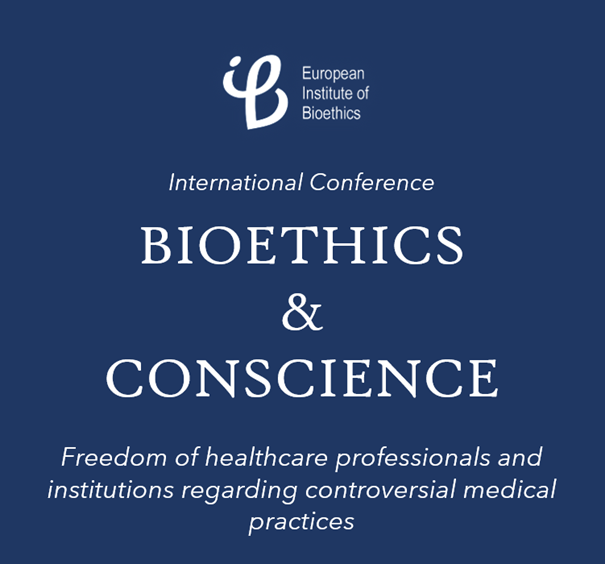Category: International
Bioethics and Conscience
International Conference
European Institute of Bioethics

Monday, October 4, 2021
UCLouvain – Faculty of Medicine – Brussels Campus
Scientific committee :
Prof. Benoît Beuselinck – KU Leuven – UZ Leuven
Prof. Louis-Léon Christians – UC Louvain
Prof. Willem Lemmens – University of Antwerp
60 € – The conference registration fee includes full access to the conference, lunch break and coffee breaks. Free registration for students.
Trans-mission
What’s the Rush to Reassign Gender?
Center for Bioethics and Culture
Submission to the World Medical Association
Public Consultation on a draft devised version of the International Code of Medical Ethics
The Anscombe Bioethics Centre
The Anscombe Bioethics Centre
The Anscombe Bioethics Centre is the oldest national bioethics centre in the United Kingdom, established in 1977 by the Roman Catholic Archbishops of England and Wales. It was originally known as The Linacre Centre for Healthcare Ethics and was situated in London before moving to Oxford. The Centre engages with the moral questions arising in clinical practice and biomedical research. It brings to bear on those questions principles of natural law, virtue ethics, and the teaching of the Catholic Church, and seeks to develop the implications of that teaching for emerging fields of practice. The Centre engages in scholarly dialogue with academics and practitioners of other traditions. It contributes to public policy debates as well as to debates and consultations within the Church.
A key issue: conscientious objection
For the first time this draft Code introduces the idea of “conscientious objection”:
Paragraph 27 reads:
Physicians have an ethical obligation to minimise disruption to patient care. Conscientious objection must only be considered if the individual patient is not discriminated against or disadvantaged, the patient’s health is not endangered, and undelayed continuity of care is ensured through effective and timely referral to another qualified physician.*
* This paragraph will be debated in greater detail at the WMA’s dedicated conference on the subject of conscientious objection in 2021 or 2022. However, comments on this paragraph are also welcome at this time.
Unfortunately, this is deeply problematic as a statement of the rights of conscience in medicine. In the first place it utterly fails to establish the duty of doctors to object to practices and procedures that are unconscionable because harmful, discriminatory, unjust or unethical. The right to conscientious objection is based on the duty to be conscientious which is fundamental to medical ethics. . . continue reading
Comment on the draft International Code of Medical Ethics of the World Medical Association
European Institute of Bioethics
In the context of the International Code of Medical Ethics’ revision, the European Institute of Bioethics (EIB) would like to share some comments with the World Medical Association (WMA) Assembly on paragraph 27 of the draft.
Since 2001, the European Institute of Bioethics has developed an expertise in healthcare ethics, with a special focus on the right of healthcare practitioners to freedom of conscience in their practice.
We acknowledge that the International Code of Medical Ethics (hereafter: the Code) is not a binding instrument for the WMA member states. However, one cannot deny the considerable influence the Code may have on national codes of deontology and even on national laws. Moreover, physicians and healthcare organizations expect from the WMA to promote the highest quality of healthcare relationship between physicians and patients.
Paragraph 27 of the Code is drafted as follows:
Physicians have an ethical obligation to minimise disruption to patient care. Conscientious objection must only be considered if the individual patient is not discriminated against or disadvantaged, the patient’s health is not endangered, and undelayed continuity of care is ensured through effective and timely referral to another qualified physician.
In the following note, we discuss one by one the different parts of this paragraph which we consider, written as such, highly problematic for the physicians’ rights and the patients’ care. . . continue reading